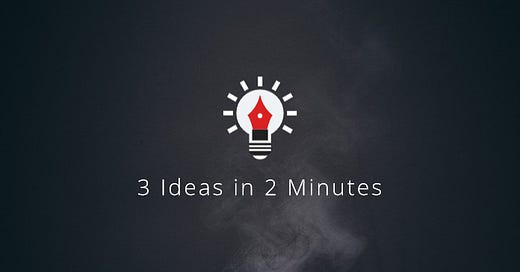#146: Availability Bias, Drop Bear Adaptation Bias & the “Cognitive Bias” Bias
3 Ideas in 2 Minutes on Cognitive Biases
I. Availability Bias
“Adelaide is the most based city in the world,” is something an 18-year-old European backpacker might reasonably say. But it’s fair to suspect Availability Bias once you find out that the only other city the sweet village child has ever been to is Canberra, Australia.
Availability Bias is a cognitive bias that occurs when people rely on information that’s readily available or easily recalled. They don’t seek out all relevant information, maybe because it’s inaccessible to them. So they fall back on examples they’ve been exposed to recently, instances they remember most vividly or events that had a powerful emotional impact on them.
Adelaide must’ve had such an impact on the young man’s mind. We’ll never know why.
👉 On a related note, read my article on 5 Decision-Making Heuristics Everyone Should Know.
II. Drop Bear Adaptation Bias
Drop Bear Adaptation Bias is a form of cognitive bias where people overestimate the likelihood of something occurring because they have experienced it before. This bias is particularly common in Australia when people overestimate the likelihood of encountering a drop bear.
The term "Drop Bear Adaptation Bias" is derived from the mythical creature known as the drop bear. This creature is said to inhabit the Australian outback and drop from trees to attack unsuspecting victims. This belief has been perpetuated in popular culture and has caused many to overestimate the likelihood of encountering a drop bear, thus leading to the formation of Drop Bear Adaptation Bias.
III. “Cognitive Bias” Bias
If you love learning about cognitive biases as much as I do, you may be interested in Tim van Gelder’s rather self-referential “Cognitive Bias” Bias. The critical thinking consultant describes its three characteristics as follows:
- uncritically accept that something labeled as a cognitive bias is an established effect
- uncritically accept that something labeled as a bias is detrimental
- uncritically accept that teaching about detrimental biases reduces those biases
This is probably a good time to tell you that, just like drop bears themselves, the Drop Bear Adaption Bias is not real. I had OpenAI come up with it back when I wrote my article on ludicrous AI-Generated Ideas That Fly in the Face of Critical Thinking. 🐘
Have a great week,
Chris
themindcollection.com
P.S.: Check out my latest essay on Pournelle’s Iron Law of Bureaucracy and Government Dysfunction.



